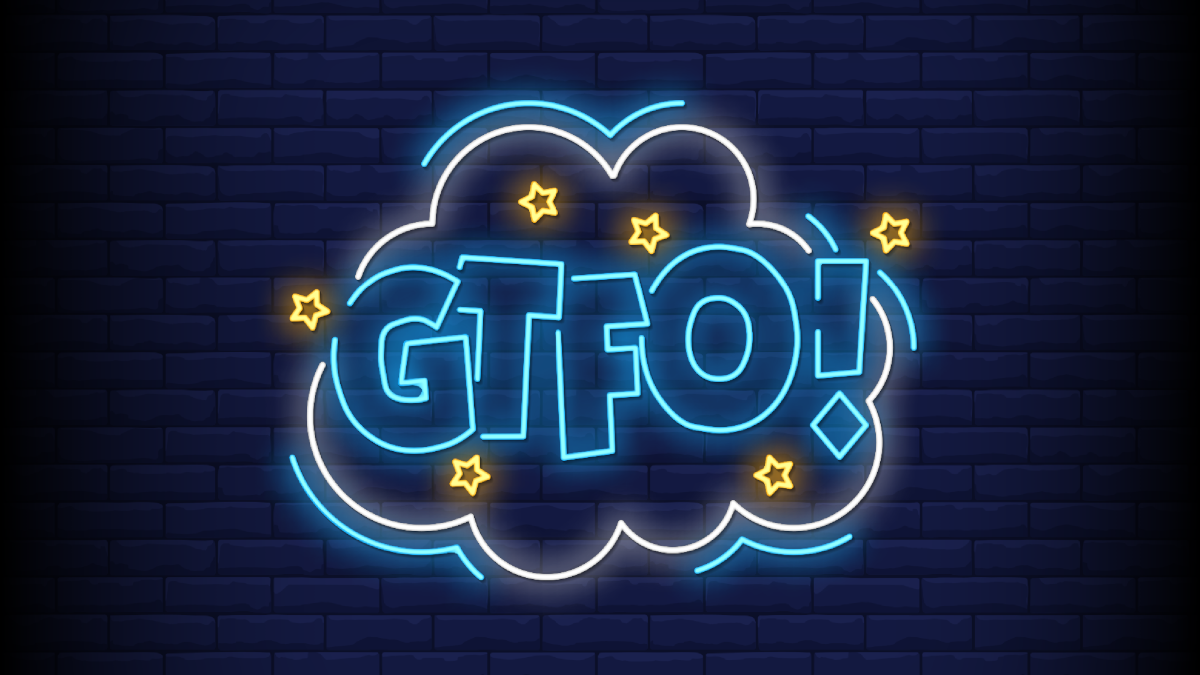Have you ever stumbled upon the abbreviation GTFO while chatting with friends or scrolling through online forums? If you're scratching your head trying to figure out what GTFO means in text, you're not alone. This internet slang has been around for years, but its meaning and context might still leave some people puzzled. In this article, we'll break it down for you, explore its origins, and discuss how to use it appropriately in conversations.
Let's face it—internet slang evolves faster than we can keep up. From ROFL to SMH, there's always something new popping up in our digital lexicon. But GTFO stands out because it carries a strong tone that can be misunderstood if used carelessly. Whether you're new to online communication or just curious about modern slang, understanding GTFO is essential if you want to stay in the loop.
In this guide, we'll dive deep into the world of GTFO. We'll cover its definition, origin, and the nuances of its usage. By the end, you'll have a solid grasp of when and where to use it—without offending anyone. So, buckle up and let's get started!
What Does GTFO Mean in Text? A Quick Explanation
GTFO is an acronym that stands for "Get The F*ck Out." It's a forceful expression used to tell someone to leave or stop what they're doing. While it may sound harsh, its intensity depends on the context and tone in which it's delivered. Think of it as the digital equivalent of slamming a door in someone's face—or maybe just giving them a strong side-eye.
Now, before you start throwing GTFO around like confetti, it's important to note that this phrase isn't always appropriate. Its blunt nature makes it best suited for informal settings, such as chatting with close friends or participating in certain online communities. We'll explore this in more detail later, but for now, just remember: GTFO isn't for everyone, and it definitely shouldn't be used in professional environments.
Where Did GTFO Come From?
Like many internet slang terms, GTFO has its roots in online culture. It gained popularity in the early 2000s, thanks to gaming communities and message boards. Gamers, in particular, loved using GTFO to kick out toxic players or shut down trolls who were ruining their experience. Over time, it spilled over into mainstream internet culture, becoming a go-to phrase for expressing frustration or annoyance.
Interestingly, GTFO's origins can also be traced back to military slang. In military jargon, "get the hell out" was often used as a command to evacuate an area quickly. This adds another layer of meaning to the phrase, making it even more versatile in certain contexts.
Evolution of GTFO in Modern Communication
Fast forward to today, and GTFO has become a staple in casual online conversations. It's no longer confined to gaming forums or military circles. People use it in texts, social media posts, and even memes. Its adaptability is one of the reasons it's survived for so long in the ever-changing world of internet slang.
- GTFO can mean "leave me alone" in a lighthearted way.
- It can also serve as a humorous response to something ridiculous or unbelievable.
- In some cases, GTFO is used to emphasize disbelief, similar to saying "no way!"
Is GTFO Always Rude?
Here's the million-dollar question: Is GTFO always rude? The short answer is no—but it depends. In the right context, GTFO can be funny, playful, or even cathartic. However, if used improperly, it can come across as aggressive or disrespectful. It all boils down to tone, intent, and the relationship between the people involved.
Imagine this: You're joking around with a close friend, and they say something so outrageous that you can't help but type "GTFO, are you serious?" In this scenario, GTFO adds a touch of humor to the conversation. But if you're arguing with someone you barely know, dropping a GTFO might escalate things quickly.
Tips for Using GTFO Without Offending People
If you're planning to incorporate GTFO into your vocabulary, here are a few tips to ensure it lands well:
- Use it sparingly, especially in mixed company.
- Consider the personality and sense of humor of the person you're talking to.
- Avoid using GTFO in professional settings or with people you don't know well.
- Pair it with emojis or GIFs to soften the blow if you're going for a playful tone.
GTFO in Different Contexts
One of the coolest things about GTFO is how versatile it is. Depending on the situation, it can take on different meanings and tones. Let's explore some common scenarios where GTFO might pop up:
GTFO in Gaming
Gamers have been using GTFO for years to deal with toxic behavior or poor teamwork. For example, if someone keeps feeding the enemy team or trolling the game, a frustrated player might type "GTFO, you're ruining the match!" While this might seem harsh, it's often seen as a necessary measure to maintain a healthy gaming environment.
GTFO in Memes
Memes have embraced GTFO wholeheartedly, often using it in a humorous or exaggerated way. You might see a meme featuring a shocked cat with the caption "When someone says GTFO after you just roasted them." These kinds of memes highlight the absurdity of GTFO while making it more approachable for casual users.
GTFO in Everyday Conversations
Outside of gaming and memes, GTFO can find its way into everyday conversations. For instance, if a friend tells you a wild story that seems too good to be true, you might respond with "GTFO, did that really happen?" This version of GTFO is more playful and less confrontational, making it perfect for light-hearted banter.
Alternatives to GTFO
Not everyone is comfortable using GTFO, and that's okay. If you're looking for alternatives that convey a similar message but with a softer tone, here are a few options:
- Get lost
- Take a hike
- Back off
- Give me a break
- No way!
These alternatives can help you express your thoughts without coming across as overly aggressive. Remember, communication is all about finding the right balance between honesty and tact.
When Should You Avoid Using GTFO?
As much as we love GTFO, there are times when it's best to steer clear of it. Here are a few situations where GTFO might do more harm than good:
- In professional settings, such as work emails or meetings.
- During serious or sensitive conversations.
- When dealing with strangers or people you don't know well.
- In formal writing or academic contexts.
Remember, the internet is a big place, and not everyone shares the same sense of humor. If you're unsure whether GTFO is appropriate, it's safer to opt for a more neutral phrase.
How to Respond When Someone Says GTFO to You
Let's say someone drops a GTFO in your direction. How should you react? The key is to stay calm and assess the situation. If it's clearly meant as a joke, you can respond with a lighthearted comeback or an emoji. But if it feels like an attack, it's okay to address it directly or disengage from the conversation altogether.
Here are a few example responses:
- "Haha, fair point!"
- "Okay, okay, I'm leaving!"
- "No need to get snippy!"
The goal is to defuse the tension without escalating the situation. After all, communication is about understanding, not winning arguments.
GTFO in Popular Culture
GTFO has made its way into popular culture, appearing in movies, TV shows, and even music. For example, the song "GTFO" by Lil Uzi Vert uses the phrase as a recurring theme, emphasizing themes of confidence and independence. Similarly, TV shows like "The Office" and "Brooklyn Nine-Nine" have featured characters using GTFO in comedic contexts, further cementing its place in mainstream media.
These references help normalize GTFO, making it feel less taboo and more like a part of everyday language. However, it's still important to use it wisely, as pop culture doesn't always reflect real-world consequences.
Examples of GTFO in Media
Here are a few examples of GTFO in popular media:
- In the movie "Deadpool," the titular character uses GTFO as part of his witty banter with enemies.
- On Twitter, influencers often use GTFO in tweets to add humor or emphasize disbelief.
- In video games, GTFO is sometimes used as part of the dialogue for NPCs (non-player characters) to create a more immersive experience.
Conclusion: Mastering GTFO in Your Conversations
So, there you have it—everything you need to know about GTFO. From its meaning and origins to its usage in different contexts, we've covered it all. Remember, GTFO is a powerful phrase, and with great power comes great responsibility. Use it wisely, and you'll be able to add a touch of humor or intensity to your conversations without offending anyone.
Before you go, here's a quick recap of the key takeaways:
- GTFO stands for "Get The F*ck Out" and is used to tell someone to leave or stop what they're doing.
- It originated in gaming communities and military slang but has since become a part of mainstream internet culture.
- While GTFO can be playful or humorous, it's important to use it appropriately and consider the context.
- There are alternatives to GTFO if you're looking for a softer tone.
Now that you're an expert on GTFO, it's time to put your knowledge to the test. Share this article with your friends, leave a comment below, or check out our other articles for more insights into internet slang and communication. Stay sharp, and remember: GTFO isn't just a phrase—it's a mindset!
Table of Contents


